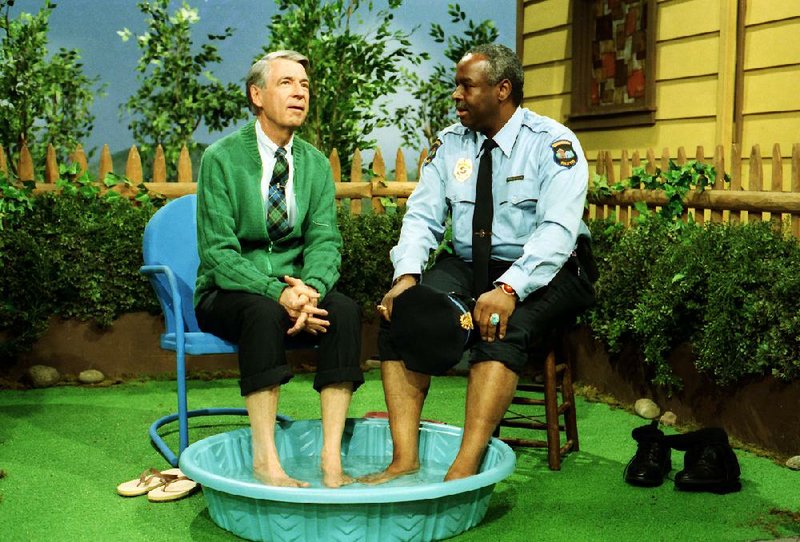Oscar-winner Morgan Neville's new documentary Won't You Be My Neighbor? doesn't reveal anything sordid about the man who created and starred in Mister Rogers' Neighborhood. But while we don't learn that he secretly ate children after the cameras stopped rolling, it's still a jolt to discover what an active and sometimes tormented mind he had.
An ordained Presbyterian minister, Rogers, who died in 2003, saw television as a way to help children deal with difficult realities that frustrate their parents. The archival excerpts presented in Won't You Be My Neighbor? have characters who will be familiar to anyone who watched his PBS series anytime between 1968 and 2001.
Won’t You Be My Neighbor?
90 Cast: Fred Rogers, Joanne Rogers, John Rogers, Jim Rogers, Francois Scarborough Clemmons, Joe Negri, John O. Pastore
Director: Morgan Neville
Rating: PG-13, for some thematic elements and language
Running time: 1 hour, 34 minutes
Yes, King Friday XIII and X the Owl show up, and Daniel Tiger, once a cheap puppet on Rogers' arm, also gets significant screen time. (Daniel now has a popular series all his own).
What's striking about the segments is that Rogers didn't remove his young viewers from a troubled world to a some fantasy safe space. Instead, he, his puppets and co-stars tried to help them understand these issues and to develop the skills to cope with problems.
Shortly after the series' debut, King Friday gets involved with a conflict that seems eerily similar to the one going on in Vietnam at the time. A confused, sad Daniel Tiger asked the kindly Lady Aberlin (Betty Aberlin) what an assassination is. This segment aired when the murder of Sen. Robert F. Kennedy was still fresh in viewers' minds. Rogers even dealt with the Challenger accident and other calamities and discussed death and other subjects that would get in the way of selling toys, candy and cereal.
In the film, Fox News' Brian Kilmeade complains that Rogers created a generation of entitled brats who want to be thought of as special even though they have done nothing to earn that recognition.
After watching Won't You Be My Neighbor?, it's obvious Rogers, a lifelong Republican, was doing something even more subversive than that.
Rogers, like fellow Pittsburgh-based filmmaker George A. Romero, found consumerism and passive thinking troubling. In one clip, he angrily tells children that it's OK to turn the TV off if its images are too scary or disturbing. Not too many personalities would have the courage to do that today.
Just as Romero's mall-walking zombies in Dawn of the Dead are a thinly-veiled slam on materialism. Rogers encouraged his viewers to reach out to others in real life. A scene where he and a black policeman (Francois Scarborough Clemmons) relax in a wading pool with their shoes off still seems like a gentle but firm rebuke to the racism that still hasn't gone away.
Neville recounts that Rogers' approach to both presentation and content for children's television was revolutionary. Whereas most shows aimed at tots moved at a frenzied, slapstick pace, Mister Rogers' Neighborhood once featured an egg timer ticking away in real time to demonstrate the length of a minute.
Rogers often stares at the camera as if he's trying to listen to the audience through the TV. He came as close as anyone to making TV interactive.
Neville includes interviews with Rogers' family and surviving collaborators, and even manages to come as close as a filmmaker can to revealing what was in the hosts' mind. Neville includes animated segments where Daniel Tiger reenacts some of Rogers' fears and insecurities.
Rogers may have been a mature and responsible adult, but Daniel served as both a surrogate for his viewers and for his own questions and concerns. He's also a reflection of Rogers love for others, and it's hard not to return it even if the man now lives only on screen.
Rogers was plagued with doubt about himself and the value of his show, but instead of a dark side, he had quirks. He was proud to weigh 143 pounds because in his numerology, one represented "I," four stood for "love' and three meant "you." Neville doesn't erect a statue of Rogers (one already stands in Pittsburgh), but he reveals that some of the most profound ideas aren't necessarily intended for grown-ups.
MovieStyle on 06/29/2018
